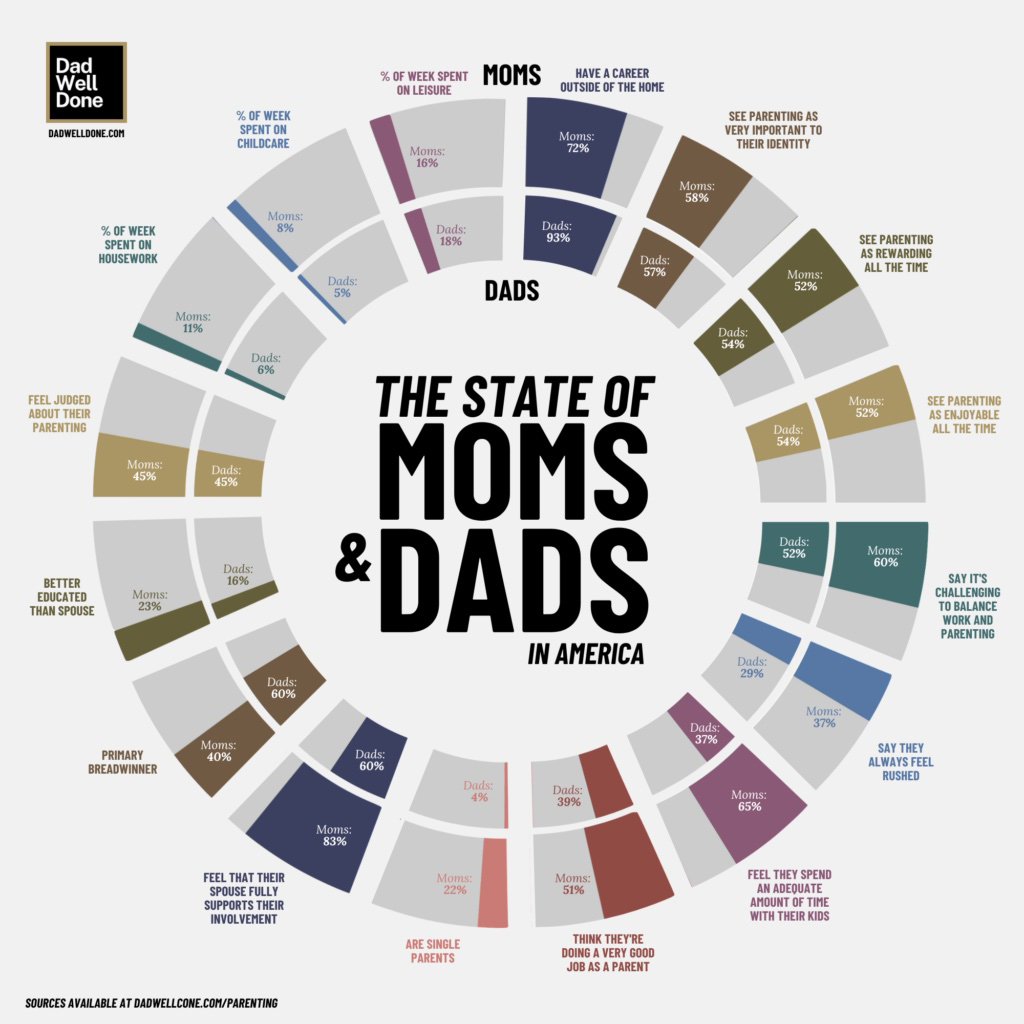Generational differences between dads and moms in America is the title for this post. Still, I am sure these findings are applicable in almost all countries. I decided to use this title as I came across a cool infographic showing these generational changes in America. More about that later…
If you have spent a little time on the ND site, you will know that I am a fine blend of English with West African ancestral links. Historically in both the UK and Ghana, roles between mom and dad have been clearly defined. While the UK has moved on overtime, with Ghana (African) not far behind, dad has traditionally been the primary breadwinner in both countries.
This narrative is prevalent worldwide; for whatever reason, be it culture or social prejudice, there is no avoiding this fact. I have come across some facts from Dad Well Done blog, which indicate these generational differences between dads and moms on parenting may be converging.
Why are Generational Differences Between Dads and Moms Still an Issue?
Many factors are why these generational differences between dads and moms still endure. Just why we cannot see the cumulative effect of teamwork, and marching towards what works best for the family, mystifies me. I do not intend to provide a detailed list but more to highlight a few of the deep-rooted issues.

Equal pay gender pay gap;
For the most part, there is a fundamental difference across the world regarding equal pay. Families finding it hard to make ends meet revert to the status quo where dad, who earns more, goes out to work, and mum takes the back seat. This translates into looking after the kids.
A campaign group in the UK warned back in 2017 that the gap in pay between men and women would take 100 years to close. This is mind-bending, considering we are meant to be in the 21st century and in a developed country. Progress in this department can be considered equal to a “snail’s pace”.
Gender salary differences have and will always remain topical. Inequalities between men and women are made worse when poverty is considered. An issue exacerbated by the increasing problem of low pay rather than lack of employment.
A study by the Institute for Fiscal Studies in 2016 found the proportion of people in paid work to be at a record high, with female employment rising accordingly, particularly among single parents.
It also found that two-thirds of poor children lived in a household with someone in paid work. This should have the consequence of reducing the burden of poverty for these households. With the boost in income from those in work, namely with so many more women in work than in the past. What was the issue? The answer is simple, the gender wage gap between mom and dad.
Maternity Pay and Implications
You don’t have to look far to see the urgent calls for providing pregnant women and new mothers with more protection at work due to discrimination. Over the years, there has been a wave of making women redundant during and after pregnancy.
I am sure this holds for different countries; it is illegal to dismiss a woman for reasons relating to having a child. However, companies customarily circumvented this as they simply found other reasons for making women redundant.
This was such a worry in the UK that there was a push to adopt the method in Germany. This ensured that from the beginning of pregnancy until four months following childbirth, employers can only dismiss an employee in rare cases – such as the company going bust – and it needs government approval.
There is also a push to ensure that women get more pay after maternity. In 2016, full-time male managers earned, on average, £8,964 more than female managers; this was about £500 per month after tax.
That gap steadily widens in the years after babies are born. I am very sure this observation stands today. What they found at the time was that wages were not lowered for women but due to reduced hours. By working fewer hours, they were missing out on experience and promotion. Men were 40% more likely than women to be promoted to management.

Paternity: whatever this may be
Paternity leave and pay are hot topics around Europe. However, I know in the USA, this topic is not as discussed and fought for as its European counterparts.
The US is the only prosperous nation offering no national paid parental leave plan. The US is considered one of the world’s wealthiest nations; however, it is anything but that when it comes to being the only wealthy country offering no national paid parental leave plan.
Technology companies such as Facebook, Netflix, and Google are different in their own policies; they offer an unmatched paternity package designed to keep their talent. But, only 21% of US workers have access to paid family leave through their employers. According to the Pew Research Centre, in 2015, both parents worked full-time in almost half of all two-parent families. If this is even the case for women, what chance do men have?
In Europe, whilst many countries do offer a form of paternity arrangements, there are still barriers in place and uptake. A lack of support from employers prevents many men from taking paternity leave.
There are ingrained attitudes among employers and concerns among new dads that they cannot afford to take leave. In addition, the general cultural expectation within companies is that women, rather than men, will take extended periods away from the workplace to be caregivers.
When the choice is offered, fewer dads are willing to take the extra paternity leave, as they could not afford to live on such low rates. A shift in pay and attitude will be needed if future generations have different attitudes.
Stop viewing dads as superstars for being a parent.
We are our own worst enemies. I wrote a blog post that conveyed this point well; I titled it “Superstar Dad in the UK; Average Dad in Sweden”. In the UK, whilst bringing up my three kids (often primary caregiver), my weekday and weekend trips to parks or forests, the library, shopping, or just going for a walk were greeted with ego-inflating statements by passers-by, including mums.
They were very impressed with a dad looking after his kids, but this in Sweden was nothing. Both mum and dad play the role of looking after the kids equally as best as possible. So we need to move away from this notion that men are doing a tremendous deed. They are not; they are a parent, what they should be doing in the first place.
A case in point was this post on a guy stepping in to look after his kids when his wife got ill. This was termed ‘The Internet Can’t Get Enough Of This Dad’s Post About Being ‘Mum’ For The Day’. His hilarious post about stepping in to take over the childcare reigns went viral; how crazy is this?
Women do this day-in-day-out, but they do not get the same response; we need to change this viewpoint.
Genetic Difference between Mum and Dad
When I had my first child, I often asked myself why I, as a dad, feel so much more exposed when nursing my kids than a mom? I found out it was nothing to do with my genetic defect of not having a breast. Which can be whipped out at a moment’s notice and can resolve 99.9% of parenting issues with babies.
Science told me that mum and dad are 95% the same in biology, with the other 5% accounting for significant differences in how we get socialised.
I wanted to know if this 5% also accounts for the parenting ease of mums. What I found was that it was in our genetic makeup. See the full article Parenting: Genetic Difference between Mum and Dad to discover my findings.
I took this trip down memory lane as I felt my blog before complimented the work done by the Dad Well Done blog below.
Generational Differences Between Dads and Moms in America
Parenting in America has drastically changed in the last few generations. With technology, booms and gender roles shift. This shift is most likely mirrored in countries around the world.
America Is now seen as an entirely different world for parents today than in any previous generation. So, where does that leave the state of parenting today? The guys at Dad Well Done blog have taken the time to develop a cool infographic to show the differences between dads and moms in America.

The cool infographic shows a visual comparison; some of the main takeaways from it were:
- Moms and dads value parenting very much the same
- Dads are more emotionally engaged in parenting than you might think
- Dads are hard on themselves (rightfully or not) and see themselves as not doing all that they should as a dad
- Moms struggle more than dads to balance expectations. As a result, they devote more time to childcare and housework while also being active in the workplace.
To see the full blog post and figures, click on this hyperlink.
Sources
- BBC, 2016, Ban businesses from sacking new mums, [Accessed 26 May 2022]
- BBC, 2016, Gender pay gap: Asking for a pay rise after maternity leave and getting promotion, [Accessed 26 May 2022]
- BBC, 2013, Few fathers’ take extra paternity leave – TUC report, [Accessed 26 May 2022]
- Daniel Wainwright, 2017, Equal payday: What is the gender pay gap like where you are?, BBC, [Accessed 26 May 2022]
- Krystin Arneson, 29 June 2021, The US is the only rich nation offering no national paid parental-leave programme. Why is that – and could it change? BBC, [Accessed 26 May 2022]
- William Elming, 2016, The gender wage gap, IFS, [Accessed 26 May 2022]


